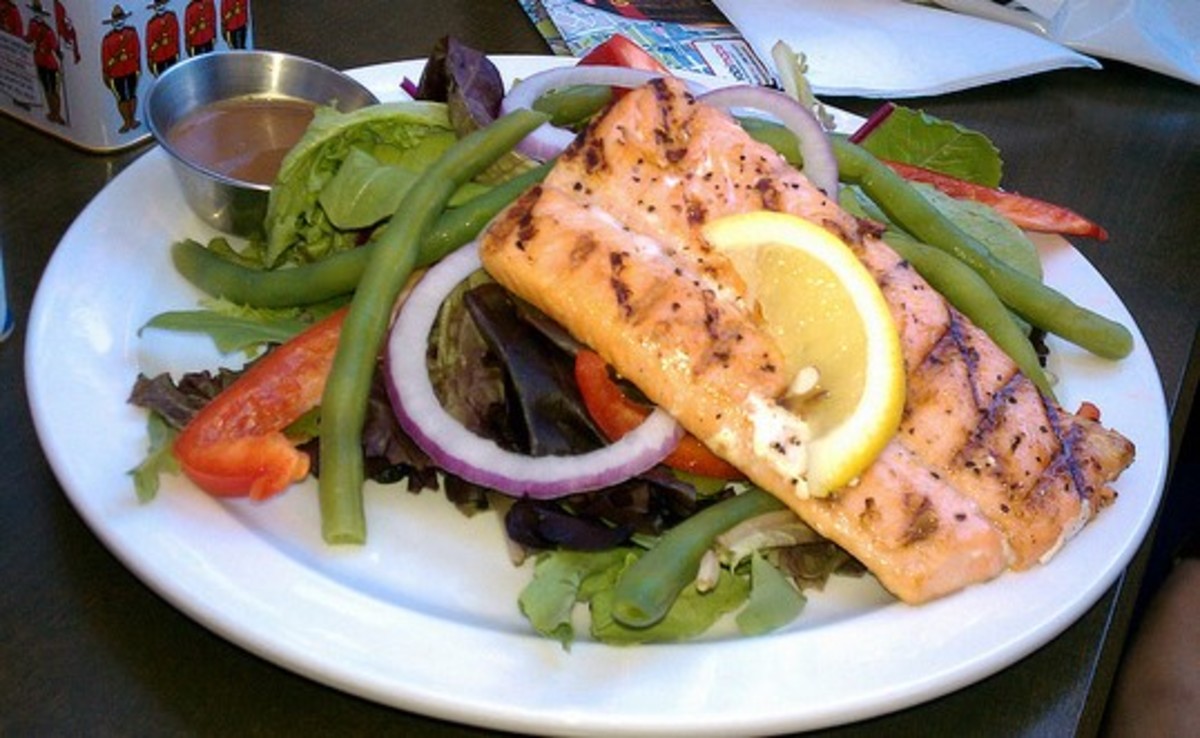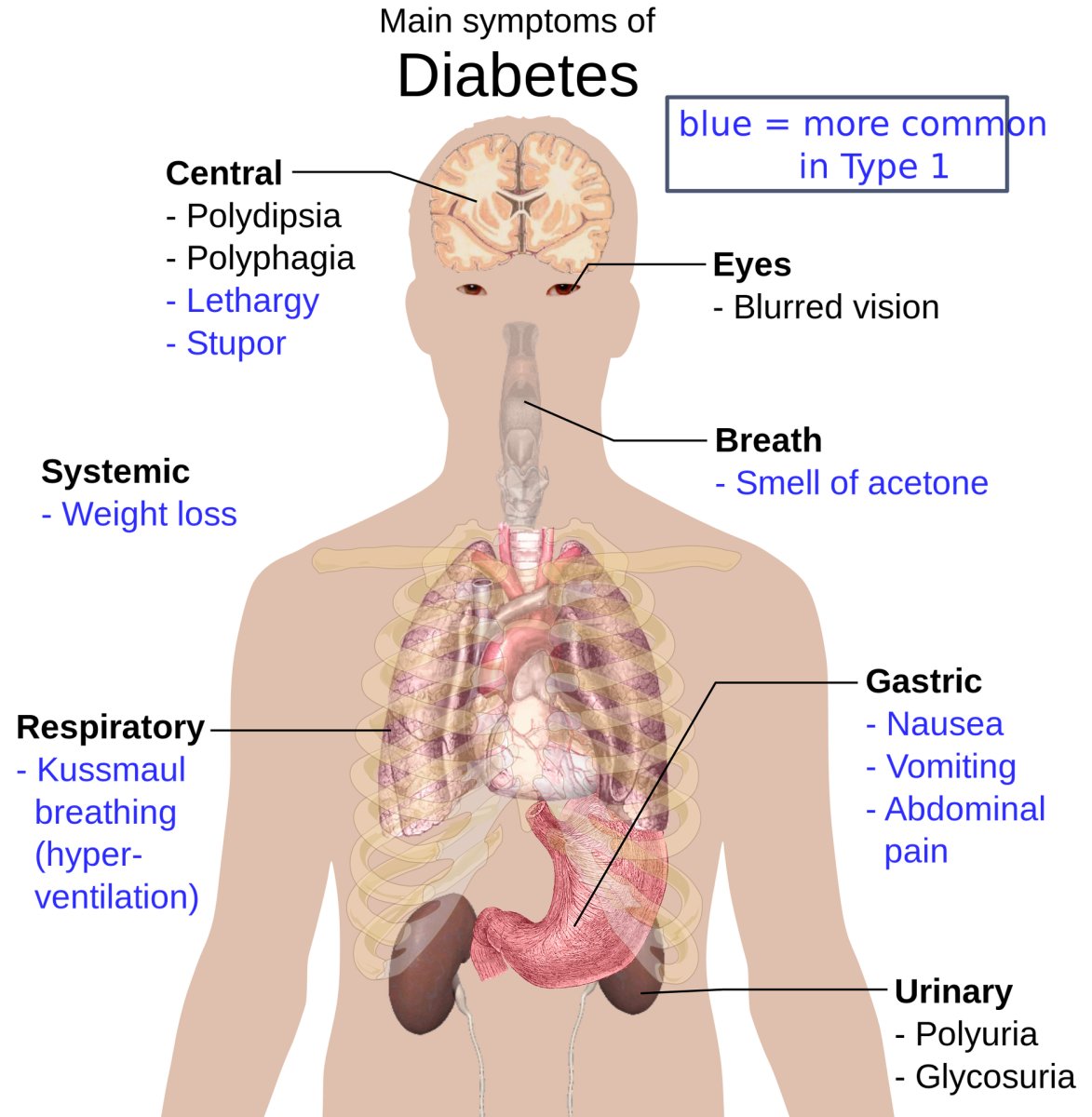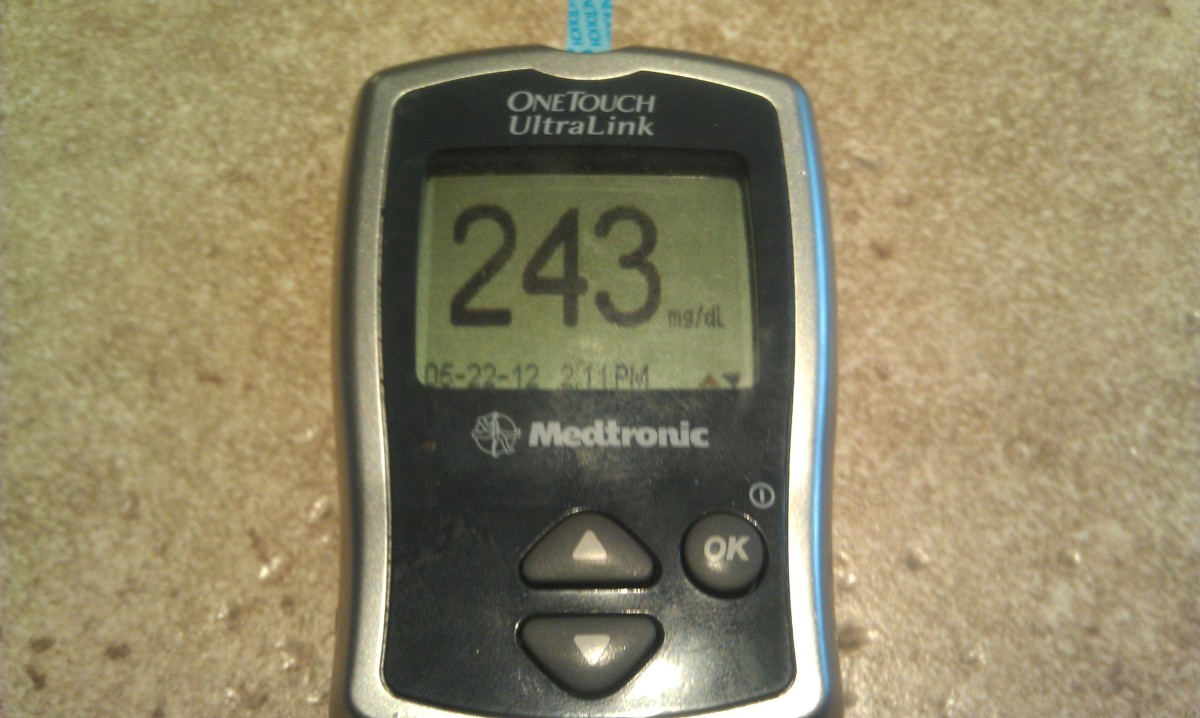What Causes Insulin Resistance?
Insulin resistance is the reduced effectiveness of the body's insulin hormone to shuttle glucose from the bloodstream into the cells for fuel. You can read about what exactly insulin resistance is in a previous article.
Insulin resistance is closed tied to metabolic syndrome that is associated with higher risk of diabetes and cardiovascular disease.
In this article, we will explore some of the causes of insulin resistance. There are multiple causes and factors of insulin resistance. An individual case of insulin resistance and be due a variety of causes or a combination of factors, including a genetic predisposition to the condition.
Dr. Bernstein writes in his book "Diabetes Solution" that ...
"There are at least five causes of insulin resistance -- inheritance, dehydration, infection, obesity, and high blood sugars." [2]
He attempts to explain on page 41 ...
"inheritance plus inflammation plus fat in the blood feeding the liver causes insulin resistance, which causes elevated serum insulin levels, which cause the fat cells to build even more abdominal fat, which raises triglycerides in the liver's blood supply and enhances inflammation, which causes insulin levels to increase because of increased resistance to insulin."[2]
But he is quick to point out that the fat that he is referring to is not dietary fat that you eat, but is the abdominal fat. They are not necessarily the same and dietary fat does not necessarily causes abdominal fat. Certain carbohydrates (such as fructose) causes abdominal fat.
As a person becomes insulin resistant, the pancreas has to pump out more insulin to compensate in order to get insulin's job done. When you have chronic high levels of insulin, your cells become more resistant to insulin.
Insulin resistance feeds on itself and snowballs in a vicious circular cycle that gets worst and worst. Ideally, it is best to avoid getting insulin resistance in the first place.
Fructose Contributes to Insulin Resistance
Although there are multiple factors that causes insulin resistance. The primary contributor of insulin resistance is fructose. Fructose is a simple sugar found in many processed foods and sugary beverages (think soda). Fructose is in high-fructose corn syrup. Toss out anything that contains that.
Fructose is also found in the sugar of fruits, honey, agave nectar and other natural products which we should consume in moderation. In fact, the typical agave nectar contains more fructose than even high-fructose corn syrup.
If you are going to eat fruit, stick with berries and avocados because they confer more of the other health benefits in other nutrients while relatively low in fructose. For the other fruits, look for ones with low fructose to glucose ratio. Fruit juices are even worst than fruits because their sugar is more concentrated and they have lost its fiber. If you drink juice, dilute is with large amounts of water.
Your typical white table sugar that some people put in coffee (although, not I) is sucrose. Sucrose is half glucose and half fructose. Glucose is not as bad as fructose. Glucose can be processed and used as fuel by virtually all cells in the body. Fructose, on the other hand can only be processed by the liver.
Article in NaturalNews writes that blood sugar dysregulation leads to insulin resistance:
"All carbohydrates break down into sugar in the body and cause a roller-coaster reaction, destabilizing blood sugar levels. Insulin is secreted by the pancreas to control the sugar level in the blood. ... constant overproduction of insulin creates serious metabolic disturbances throughout the body, including insulin resistance and diabetes."
When there is chronic fructose overload to the liver, the liver turns it into triglycerides and significantly stimulates fatty acid synthesis. Hence it produces the same effect as a high saturated fat diet.[7] High triglycerides is associated with increase cardiovascular disease risk.
Chris Kresser website says that fructose (such as in high-fructose corn syrup) is the most significance dietary cause of fatty liver which causes insulin resistance.[8] Interestingly plant-based saturated fats such as from coconut oil and butter feed to rats did not cause fatty liver, only "peripheral" fat.[9]
Dr. Lustig at Google Talks
Dr. Robert Lustig says that chronic fructose exposure causes metabolic syndrome[4] And insulin resistance one of the symptom of metabolic syndrome. In his talk at Google Talks, he says there are food category of food stuff that can cause metabolic syndrome:
- Transfats
- Branched chain amino acids of isoleucine, leucine and valine (such as found in soy proteins)
- ethanol (as in alcohol)
- Fructose
It should be pointed out that branched chain amino acids are essential amino acids that play an important role in growth and maintenance. It is excess of what the body needs that is detrimental. Of course the tricky part is knowing how much the body needs.
Fructose on the other hand is not essential. In fact, if fructose disappeared from the face of the Earth, we will still do fine. Same goes for trans fat.
Stress can also cause insulin resistance
Cortisol is our stress hormone put out by the adrenal glands when under physical or psychological stress. While this is fine in occasional instances; when chronically elevated, cortisol can cause insulin resistance.
The Cortisol Connection book writes that ...
"... insulin resistance is certainly exacerbated by, if not exactly caused by, a diet high in refined carbohydrates (sugars) and by elevated cortisol levels (from chronic stress). Refined carbohydrates increase glucose and insulin levels in the blood, while cortisol reduces the effectiveness of insulin and reduces the body's ability to burn fat for energy." [page 96]
A scientific paper writes that "It is well established that cortisol excess causes insulin resistance in man" and give example of people with Cushing's syndrome (which over produces cortisol) tend to have higher insulin resistance.
Trans Fats
To confirm what Dr. Lustig is saying about trans fat causing metabolic syndrome, there is an article titled "Types of Dietary Fat and Risk of Coronary Heart Disease: A Critical Review" in Journal of American College of Nutrition says ...
"high intake of trans fat may promote insulin resistance in humans"
Certainly, there are very few people who would argue for trans fat. Trans fat is "partially hydrogenated vegetable oil" and if you see that in the ingredient list of any food product, buy something else. In fact, vegetable oil as I have written about in another article should be avoided.
Others have implicated saturated fats as well. A journal article on PubMed writes ...
" In humans, high-fat diets, independent of fatty acid profile, have been reported to result in decreased insulin sensitivity. Saturated fat, relative to monounsaturated and polyunsaturated fat, appears to be more deleterious with respect to fat-induced insulin insensitivity."
High Triglyceride and insulin resistance
In his book, Dr. Neal Barnard's Program for Reversing Diabetes, he believes the causes insulin resistance to be intramyocellular fat. This is the fat within the cell itself. Think of insulin as the key that approaches the cell and unlocks the gates at the cell membrane so that glucose fuel can be let in. The fat within the cell "gums up the lock" and interferes with insulin's signalling process.[1]
In more technical jargon, a paper in the American Diabetes Association says ...
"High levels of some but not all dietary fats lead to insulin resistance in rats. ... impaired insulin action in skeletal muscle relates to triglyceride accumulation, suggesting intracellular glucose-fatty acid cycle involvement;"[5]
Triglyceride is a molecule containing three fatty-acid molecules; so it is kind-of like a fat. It is produced by the body. High carbohydrate diet causes raise in triglycerides. Triglycerides causes insulin resistance. High saturated fat consumption can cause these increases in intramyocellular fat that lead to insulin resistance. Rats fed on a high-fat diet had developed insulin resistance.
Abdominal Obesity Associated with Insulin Resistance
Abdominal fat is an indication of insulin resistance. Although it is still possible for a thin person to have insulin resistance. Abdominal fat is caused by insulin resistance as well as it being a contributor to insulin resistance.
Dr. Bernstein writes in his book, Dr. Bernstein's Diabetes Solution, that ...
"Insulin resistance appears to be caused at least in part by inheritance and in part by high levels of fat -- in the form of triglycerides released from abdominal fat -- in the branch of the bloodstream that feeds the liver." [2][page 40]
It is the abdominal fat that is the worst. Subcutaneous fat is not that bad. And in fact people with some amount of subcutaneous fat live longer than people without.
Dr. Bernstein continues ...
"The higher the ratio of abdominal fat (and, to a lesser degree, total body fat) to lean body mass, the less sensitive to insulin you'll tend to be. ... high triglyceride levels a direct cause of insulin resistance, ..."[2][page 129]
Genetic Predisposition
As with many things, genetics plays a role in who is more likely to have insulin resistance. One study makes the conclusion that ...
"insulin resistance in the skeletal muscle of insulin-resistant offspring of patients with type 2 diabetes is associated with dysregulation of intramyocellular fatty acid metabolism, possibly because of an inherited defect in mitochondrial oxidative phosphorylation."[6]
Chronic Inflammation
Now we get to some secondary causes of insulin resistance.
Systemic inflammation is another cause of insulin resistance. Abdominal fat is associated with systemic inflammation. Fat tissue can secrete inflammatory cytokines such as IL-6 and TNF-alpha.[10] Low-grade chronic inflammation decreases the insulin signaling mechanism.[8]
Scientific American article says ...
"Researchers have since shown that TNF-alpha—and, more generally, inflammation—activates and increases the expression of several proteins that suppress insulin-signaling pathways, making the human body less responsive to insulin and increasing the risk for insulin resistance."
The sad part is that inflammation causes insulin resistance and insulin resistance causes inflammation, leading into a vicious cycle.
Inflammation is related to the omega-6 to omega-3 ratio. The higher this ratio, the greater tendency for inflammation. [reference] In the book Fat Chance page 114, it shows that omega-6 fatty acids from farm-raised animals fed corn and soy contributes to insulin resistance. Wild and free-range animals have less omega-6 and more omega-3.
Nutritional Deficiency and Insulin Resistance
Deficiency in magnesium has been linked to insulin resistance.[11] Magnesium is an essential mineral that plays an important role in insulin production and carbohydrate metabolism.
Vitamin D is one of the more important vitamins. Deficiency in vitamin D may contributes to insulin resistance.[reference]
News reports have mentioned that vitamin D may improve insulin sensitivity and helps prevent diabetes.
Stress is a contributing factor in many disease processes and it plays a role in insulin resistance as well. Stress depletes the body of essential nutrients such as magnesium. Stress is also associated with increase abdominal fat, which we know contributes to insulin resistance.
Here is what article on Clinsic.org mentions about the stress hormone cortisol:
"cortisol excess is characterized by hypertension, central obesity and glucose intolerance."
Note:
Article was written September 2012 and is opinion at the time of writing. Author is not a medical professional nor is this medical advice.
References:
Information is based in part on these books ...
- [1] Dr. Neal Barnard's Program for Reversing Diabetes
- [2] Dr. Bernstein's Diabetes Solution
And these references...
- [3] Insulin resistance - Wikipedia
- [4] MIT TechTV – Diet, Disease, and Dollars - Robert Lustig, M.D
- [5] Influence of dietary fat composition on development of insulin resistance in rats.
- [6] Impaired mitochondrial activity in the insulin-... [N Engl J Med. 2004] - PubMed - NCBI
- [7] Effect of High-Carbohydrate Feeding on Triglyceride and Saturated Fatty Acid Synthesis
- [8] Think skinny people don’t get type 2 diabetes? Think again.
- [9] Long term highly saturated fat diet does not induce NASH in Wistar rats
- [10] How inflammation makes you fat and diabetic (and vice versa)
- [11] Magnesium Deficiency Is Associated With Insulin Resistance in Obese Children
- [12] Whole Health Source: What Causes Insulin Resistance? Part V










